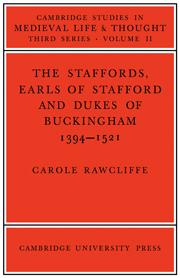Book contents
- Frontmatter
- Contents
- Dedication
- Acknowledgements
- Abbreviations
- Introduction
- 1 THE RISE OF THE STAFFORD FAMILY, 1343–1460
- 2 THE SECOND AND THIRD DUKES OF BUCKINGHAM, 1460–1521
- 3 THE MANAGEMENT OF THE STAFFORD ESTATES, 1438–1521
- 4 THE FIRST DUKE OF BUCKINGHAM'S HOUSEHOLD AND RETINUE, 1438–1460
- 5 CHANGES IN THE DUCAL LIFESTYLE, 1460–1521
- 6 THE FINANCES OF THE STAFFORDS, 14OO–1473
- 7 THE FINANCES OF THE STAFFORDS, 1473–1521
- 8 THE STAFFORDS AND THEIR COUNCIL
- 9 THE STAFFORDS AND THE COMMON LAW
- CONCLUSION
- APPENDICES
- Manuscript Sources
- Printed Sources
- Index
7 - THE FINANCES OF THE STAFFORDS, 1473–1521
Published online by Cambridge University Press: 07 October 2011
- Frontmatter
- Contents
- Dedication
- Acknowledgements
- Abbreviations
- Introduction
- 1 THE RISE OF THE STAFFORD FAMILY, 1343–1460
- 2 THE SECOND AND THIRD DUKES OF BUCKINGHAM, 1460–1521
- 3 THE MANAGEMENT OF THE STAFFORD ESTATES, 1438–1521
- 4 THE FIRST DUKE OF BUCKINGHAM'S HOUSEHOLD AND RETINUE, 1438–1460
- 5 CHANGES IN THE DUCAL LIFESTYLE, 1460–1521
- 6 THE FINANCES OF THE STAFFORDS, 14OO–1473
- 7 THE FINANCES OF THE STAFFORDS, 1473–1521
- 8 THE STAFFORDS AND THEIR COUNCIL
- 9 THE STAFFORDS AND THE COMMON LAW
- CONCLUSION
- APPENDICES
- Manuscript Sources
- Printed Sources
- Index
Summary
The almost total loss of material concerning the Stafford estates between 1473 and 1483 makes it impossible even to speculate about the size of Duke Henry's income. That he benefited financially from the Duchess Anne's death in 1480 goes without question, for she had until then retained as her dower the most productive English lordships, leaving Buckingham to face the problems of administration in Wales. He had nevertheless been fortunate in gaining entry to the customary two thirds of his inheritance in January 1473, some six years before actually coming of age. While still a minor he had also obtained possession of land worth an annual 400 marks which was due to him in reversion from the late Sir Henry Stafford. Finally, in 1478, Edward IV relinquished his claim to the lordship of Cantref Selyf in favour of Duke Henry, although it is unlikely that the latter derived any profit from the award. Very little is known of the Marcher estates during this period. Frequent visits to Brecon Castle did not enhance Buckingham's popularity among the Welsh, nor could he rely upon the unqualified support of his senior administrators; these two factors may well have intensified a decline in revenues, with which, as a young and inexperienced landlord, he was ill equipped to deal. Between them the receiverships of Newport and Brecon produced no more than £429 of the £1,419 available to Duke Henry in clear revenues over the period Michaelmas 1476 to ca. 23 May 1478.
- Type
- Chapter
- Information
- The Staffords, Earls of Stafford and Dukes of Buckingham1394–1521, pp. 125 - 143Publisher: Cambridge University PressPrint publication year: 1978



